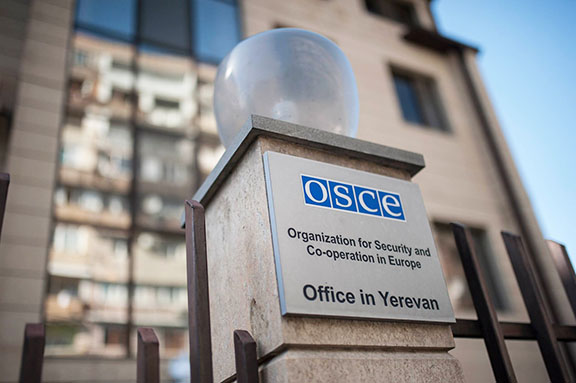Why OSCE Office in Yerevan closed and what consequences it will have?
20:04, May 13, 2017 | News, Other news Head of Helsinki Citizens’ Assembly Vanadzor, human rights agent Artur Sakunts is the interlocutor of Lragir.am.
Head of Helsinki Citizens’ Assembly Vanadzor, human rights agent Artur Sakunts is the interlocutor of Lragir.am.
Mr. Sakunts, several months ago Armenia’s civil society sent a letter to the OSCE head office based in Vienna expressing concerns that the OSCE Office in Yerevan might close. In fact we have a situation, when the office is closing on Azerbaijan’s demand, what does this mean?
It is noteworthy that in the South Caucasus there used to be OSCE offices in Georgia and Azerbaijan. The OSCE office in Georgia closed down after the Russian-Georgian war, upon the demand of Russia, due to not receiving the Russian side’s consent. With a further move the Azerbaijani authorities did not simply extend OSCE mandate in Azerbaijan. Only Yerevan office was remaining. In fact, the Armenian authorities did not have any objections related to the OCSE office in Yerevan; on the contrary, they were interested in its functioning. However, on the one hand there is a fact that Russia played an immediate role on the closing down of the OCSE Office in its neighboring Georgia, and on the other hand, the Azerbaijani authorities were the initiators to close the OSCE office in their country. Hence, those two countries have identical dispositions and display a similar initiative regarding the closing of the OCSE offices. Now one must assume that these two countries at least had their interest in the closing of the OSCE office in Yerevan.
What consequences can it have for Armenia?
First of all, with the OSCE as an interstate agency, OSCE member states encounter an actual challenge in the face of Russian and Azerbaijani authorities, which act to restrict OSCE activities. Other OSCE member states should be first of all concerned by this fact. Secondly, such an action has a negative impact especially on a country like Armenia, since the representative office of the OSCE in Armenia, one of the international outstanding agencies operating in the field of human rights, is in fact closing down. Certainly, Armenia continues being an OSCE member state like Russia and Azerbaijan, but the cooperation will be complicated to some extent: with the absence of the office there will no longer be an everyday communication regime. Here the next issue is the responsibility of the Armenian authorities. For quite a long time, the Republic of Armenia failed to join the positions of the OSCE countries that pursued a democratic path, which was regularly manifested in various OSCE meetings when the RF undertook obvious moves and actions that contradicted the OSCE principles. Moreover, it should be recalled that some of the OSCE member countries of former Soviet Union, including Central Asia countries, Azerbaijan and the RF initiated a statement which related to the non expediency of the international observation mission during elections, and unfortunately Armenia also joined it. Moreover, for a long time the RA authorities joined the initiatives taken by the RF, which were not directed to the expansion of the activities by the OCSE institutes or to a more intensified cooperation with them, but they were more aimed at the restriction of the OSCE influence. It means they failed to withstand the pressures existing in Armenian-Russian relations.
The behavior of the RA authorities at the voting of the UN General Assembly is noteworthy, when the voting on the annexation of the Crimea by Russia or apparent aggression of Russia in the East of the Ukraine took place. Thus, the RA authorities weakened their positions by stepping away from the principles underlying that international agency, and kept their dispositions in line with those of the governments having positions of authoritarian nature. And Armenia weakened its positions to withstand such challenges as the closing of the OSCE office. Therefore, the RA government also bears its share of responsibility in this respect. Can the closing of the OSCE office in Yerevan have any impact on the peaceful resolution of the Nagorno-Karabakh conflict?
The OCSE Minsk Group and three Co-Chair countries are involved in the peaceful resolution of the Nagorno-Karabakh conflict. Unfortunately, currently we are in a situation when the RF, one of the Co-Chair countries, has been for long undertaking measures to resolve the conflict. I mean the arms race, the steps against the Minsk format. In the meantime, the inadequate response and evaluations of the RA authorities regarding the apparent actions of the RF directed against the OSCE principles. The aforementioned actions entailed that during the process of the resolution of the Nagorno-Karabakh conflict Armenia found itself in the intersection of authoritarian countries’ interest.
In this regard, it turns out that through their policy the RA authorities have appeared among those, who are in favor of resolving the Nagorno-Karabakh conflict via force. Therefore, the RA authorities record a regress from the OSCE principles. It appears that the RA authorities are not an ally to the USA and France, which support the peaceful resolution of the Nagorno-Karabakh conflict. It is an illogical situation, when the RA Government is in the heart of the interests of the countries which are either in favor of using force methods, or encouraging the supporters of force use like Russia. This is the naked truth, however hard the RA authorities try to conceal it through various diplomatic statements and definitions today; nonetheless, it is impossible to disguise this obvious problem which emerged due to their immediate participation.
